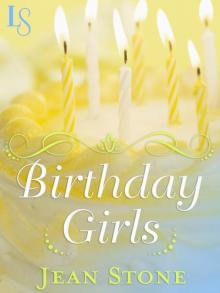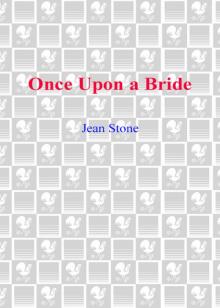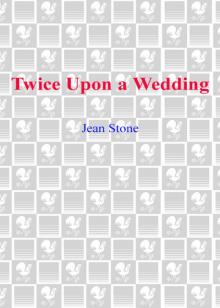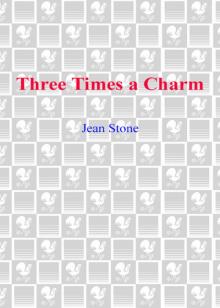- Home
- Jean Stone
Trust Fund Babies
Trust Fund Babies Read online
Mary Beth had never thought she would venture to the underbelly of the West Side, no matter that it was broad daylight and there were cops on every corner.
Then again, she hadn’t had to sell her jewelry every day.
It was easier than she’d expected, to pick out which things she could do without, which would not be missed by the wedding guests. She could not, of course, go back to Van Cleef or Tiffany’s or the other places where her trinkets had come from; she could not even visit a prominent estate jeweler: Word would spread too quickly that Mary Beth was broke.
Broke!
What a dreadful, startling word that she’d never thought would be associated with an Atkinson, let alone, her.
The cab finally arrived at the address Carla had given her. Mary Beth quickly got out and tried not to look left or right but simply moved straight ahead toward the shop.
She tipped her regal head back. Act as if it’s Tiffany’s she decided.
On stiletto heels she marched into the shop as if she belonged there.
“I have jewelry,” she said. “Good jewelry. And I need to sell it.”
TRUST FUND BABIES
A Bantam Book / April 2002
All rights reserved.
Copyright © 2002 by Jean Stone
No part of this book may be reproduced or transmitted in any form or by any means, electronic or mechanical, or by any information storage and retrieval system, without permission in writing from the publisher.
For information address: Bantam Books.
eISBN: 978-0-307-49215-9
Bantam Books are published by Bantam Books, a division of Random House, Inc. Its trademark, consisting of the words “Bantam Books” and the portrayal of a rooster, is Registered in U.S. Patent and Trademark Office and in other countries. Marca Registrada. Bantam Books, 1540 Broadway, New York, New York 10036.
v3.1
Contents
Cover
Title Page
Copyright
Prologue
Chapter 1
Chapter 2
Chapter 3
Chapter 4
Chapter 5
Chapter 6
Chapter 7
Chapter 8
Chapter 9
Chapter 10
Chapter 11
Chapter 12
Chapter 13
Chapter 14
Chapter 15
Chapter 16
Chapter 17
Chapter 18
Chapter 19
Chapter 20
Chapter 21
Chapter 22
Chapter 23
Chapter 24
Chapter 25
Chapter 26
Chapter 27
Epilogue
Dedication
Acknowledgments
Other Books by This Author
About the Author
PROLOGUE
Lester Markham is gone, and so is your trust fund,” Carla DiRoma said into the huge, gilt-framed mirror that hung in the half-empty Park Avenue office. She took a slow breath and looked over her shoulder. Twenty-six years, Monday through Friday, nine to five, Carla had worked there as the loyal secretary to the investment banker who’d now disappeared, along with the money of his three trusting clients, the Atkinson cousins.
Mary Beth.
Nikki.
Gabrielle.
Three women who had, from the moment of conception until this late spring morning, had it all.
Carla frowned at her reflection. Little lines creased her low forehead and the corners of her wide mouth. She fluffed the short, curly perm that her mother always had said was “too severe for a woman her age.” She stared at her large, forty-five-year-old, faded brown eyes and tried to look sympathetic.
“I’m sorry,” she said into the glass, “but you are dead broke.”
She supposed that was the best way to tell the three women: up-front, direct, the way she’d learned from Sister Agnes back in the dusky days of parochial school.
Still, it would not be easy.
A wave of foreboding rolled through her, riding on the fear of the unknown. After all, her life would be different as well, now that the files were empty, now that Lester’s long mahogany desk and tall leather chair sat vacant, too.
She leaned against the cool glass and tried not to think of the many times she’d checked her reflection there, trying to look her best for the well-groomed, well-positioned, well-everything-ed man who had been her boss. Though Carla was “attractive enough,” as her ex-husband had once said, she knew she did not have the beauty, the confidence, or the innate presence that women like Mary Beth, Nikki, and Gabrielle relished as their birthright. She did not have the breeding to be more than an assistant in Lester Markham’s life. She was merely schleppy Carla DiRoma, a working-class single mother of the working-class Bronx, whose ailing mother had died last month, whose two sons were mostly on their own, and now whose reason for rising every morning had suddenly up and gone.
Her eyes traveled the dark-papered walls of the office to the rectangular outlines that marked where the Chagall and the Manet—Lester’s prized possessions—had hung.
Like Lester, the paintings were gone.
Adjusting the elastic waistband of her JCPenney skirt, Carla thought about the three women whose lives were about to change. Would they shop at the mall now, instead of Versace or Dior? Would they be content with pizza instead of pâté, the subway instead of stretch limos?
And did any of them have what it would take to survive in the real world, her world?
Soon, Carla would know. But first she would find each of the cousins, one at a time. She would tell them their fate in person, one-on-one, so the blow would be less severe.
It would be the least her mother would have expected.
Slowly, Carla turned from the mirror so she wouldn’t see herself smile.
1
I don’t care what you say, they must be engraved,” Mary Beth Atkinson-McNight Roulle hissed into the phone. She pressed her fingers to her temples. How hard could it be to etch the date of her daughter’s wedding onto six hundred sterling silver bubble wands? “Tiffany’s would find a way.”
“You didn’t call Tiffany’s,” snipped the other end of the line. “You wanted to save money, so you called us.”
Mary Beth sucked on a cigarette and blew out the smoke. “My mistake,” she barked, and slammed the phone into its cradle.
She stubbed out her cigarette and waved her hand in the air, as if the smoke would dissipate and no one would know that she’d sneaked a puff. But, God, how could she not? Not that her family would ever understand the pressure of trying to make Shauna’s wedding perfect.
Which, of course, it would be. For openers, it would not be here in Manhattan but at the family estate on Martha’s Vineyard, where every respectable Atkinson wedding had been held for three generations. Of course, it would be a French garden wedding. Water-colored freesia and roses, lilies, and iris would be woven into trellises, their fragrance blending with the soft sound of harps. The guests would mingle on the terraced lawn that tiered down to the sea. They would sip pink champagne, and now—with this last-minute, mother-of-the-bride brainstorm—they would also blow shimmering bubbles into the gentle breeze of the ocean-salt air, using sterling bubble wands. That would be engraved.
She would not consider that the sun might not shine, because in summer, on the Vineyard, sunshine was the law. Her mother had once said that, and Mary Beth still believed it, despite years of proof otherwise.
The wedding, she thought, her jaw clenching again. Less than six weeks—no, five—until the glorious event for which the gilt-edged invitation acceptances were already coming back in the mail.
“Mom?
” Her daughter bounded into the second-floor study. She was dressed in Cavalli rhinestone jeans and a silk zebra shirt that had set Mary Beth back more than the bubble wands, with or without the engraving. “Jason’s exhausted from finals. We want to go to the Vineyard next weekend.”
Jason was Shauna’s intended, who had finished his MBA at Harvard, not that he’d need it. Like Mary Beth, Jason’s parents flourished on their trust funds. Jason had his own chunk now that he’d turned twenty-five; in the same way, Shauna would have her share of Mary Beth’s, if this wedding didn’t suck every penny Grandfather Atkinson had passed down. She cleared her throat to ease her bitterness that there would have been more money if she’d listened to her mother twenty-two years ago and not married Eric Roulle, pauper of the free world, nice guy though he was. Eric, the same nice guy who’d asked this morning for twelve thousand dollars for a short trip to Brazil in the name of his coin-collecting bad habit. She often wondered if the coins her husband truly enjoyed were not the rare ones but hers.
“The house isn’t open,” she told her daughter.
Shauna flopped on the leather chair, tossing her gazellelike legs over the Louis XV tapestry armchair as if it were a bar stool. She flipped back her long copper hair the way Mary Beth might have done in the sixties.
“We don’t need the whole house, Mom. We just want a break before the craziness starts.”
Mary Beth did not comment that “craziness” was not a very appropriate way for Shauna to refer to her wedding, the wedding over which Mary Beth was breaking her back and neck and pocketbook so it would be perfect. She did not comment, because she knew Shauna was not as obsessed by the wedding as Mary Beth was. Kids today—even her daughter—simply didn’t get the importance of protocol and … things. “I hadn’t planned to get the house ready until just before the wedding.”
“Please, Mom? I want Dee to come, too. We need fittings for our gowns. If you can’t get the regular cleaning service, maybe Aunt Nikki knows someone.”
Nikki was not really Shauna’s aunt, but Dee’s quirky mother, Mary Beth’s cousin who had once been her friend, before age and attitudes had altered their innocence. Nikki lived on the island estate year-round, in the lighthouse, for God’s sake, the family eccentric because every family needed one. Shauna had always adored Nikki, though the woman didn’t know Vuitton from Valentino. Or care.
“Don’t call Nikki. I’ll take care of it.” One more thing to add to the list. The never-ending things-to-do list. It occurred to her that it was a good thing she’d never needed a job. There simply would not have been time. “Now leave me alone. I’m trying to find bubble wands.”
“Doesn’t Tiffany’s have them?”
“Well. Yes.”
Shauna untangled her legs and stood up. “So what’s the problem?”
“The problem is, your flowers alone are going to cost a hundred thousand. I was hoping to save a few dollars here and there.”
“What?” Shauna asked, rolling her eyes. “Cut corners on my wedding?” She pressed her hand to her chest as if sliding into a faint.
Sarcasm did not wear well on her otherwise beautiful daughter. Mary Beth wondered if Shauna would be so cavalier if she’d not been born into money, or if she weren’t marrying it. Flipping back her hair in her daughter’s indifferent manner, Mary Beth said, “Don’t be silly, my darling. I only wanted to be sure you were paying attention.” She returned to her list and chastised herself for the gross oversight. Jason’s family, after all, was so old and so respected, their name had once been hand-calligraphied into the social register. Proof that Shauna was worthy to carry on the bloodline should, indeed, be reinforced with a small turquoise Tiffany box at each place setting. If the box were not turquoise, it simply wouldn’t do.
Whatever had she been thinking?
It was nice to know you could still count on some things in this world, like the pristine glass cases at Tiffany’s on Fifth Avenue at Fifty-seventh that stretched down the aisles and beckoned with gold and silver and diamonds and pearls and all things that made life worthwhile.
Mary Beth stepped inside, paused, and inhaled the opulent scent. It was a habit her mother had taught her; a way of remembering her place in life. She felt a quick ache that Shauna had told Dorothy about the wedding. But how would Shauna—or Mary Beth, for that matter—have expected it would be the one thing that Dorothy had no trouble remembering? Each time Mary Beth went to Harriman House now, her mother insisted she would attend the event. How did one tell a seventy-three-year-old woman that Alzheimer’s and reality and God, if there still was one, clearly had made other plans?
“Ms. Atkinson?” A salutational voice obediently called from beside her, as if it, too, knew Mary Beth’s place. “Good morning.”
She pushed her sorrow back down to her heart, then twirled on her Prada snakeskin pumps, grateful that the clerk had addressed her properly, that she’d had the sense to know that when one’s ancestors were Atkinsons, no other name mattered.
“Mrs. LaMonde is waiting for you upstairs.”
Mrs. LaMonde, of course, was Roxanne, whose last husband, Jeffrey LaMonde, had international recognition as the steel baron’s great-grandson. Hence, Roxanne had kept the name. Mrs. LaMonde was also Mary Beth’s best friend, who, surprisingly, had been available when Mary Beth phoned her for shopping reinforcement. Lately their schedules seemed too often to clash, with their chances to share laughter and wine and a few gossipy tales limited to their simultaneous monthly hair-highlighting sessions.
Mary Beth followed the clerk to the inconspicuous elevator tucked around the corner at the front of the store. She adored the tiny lift that brought only prestigious customers up to the private selection rooms, the “upstairs” where Roxanne now waited. On the short ride to Floor Two, she let out a sigh. Once a month with Roxanne was not nearly sufficient time to commiserate about Shauna’s small crises (such as needing the Vineyard house opened next weekend) and Eric’s ongoing requests (why was it a man with no money had selected numismatics as a hobby?) and the caretaking needs of her mother, God help her. Roxie was the ideal sounding board because she had no children, had been divorced three times, and had no living relatives, except for Lucky, her aging bichon frise.
She slid into the room where Roxanne sat, ogling a crystal decanter.
“I hope that’s for my daughter,” Mary Beth said, and Roxanne stood and they kissed-kissed.
“Actually, I have my eye on four Elsa Perettis. In sterling, of course.” Roxanne was talking about the wonderful silver bone candlesticks that cost over a thousand dollars apiece and would look as timeless and divine in Shauna’s home as Roxie now looked in her Anne Klein beige silks—shirt, pants, and cropped jacket to die for. She was one of the few Mary Beth knew on whom off-the-rack looked sublime, aided, no doubt, by her startling red mane of hair. Mary Beth was glad she’d changed into her long black linen pencil skirt and sleeveless turtleneck sweater that set off her blue eyes and taupe-blond hair and made her look nearly as good as Roxanne. Of course, her three-times-a-week, three-hundred-dollar-an-hour personal trainer named Hank deserved some of the credit for keeping Mary Beth in a size four. The two women sat, and Mary Beth looked back to the clerk.
“Bubble wands,” she proclaimed. “Engraved.”
The clerk smiled. “Individually boxed?”
The mother of the bride nodded.
“What about containers for the liquid? May I suggest a crystal jar, perhaps with a silver cap?”
“Show us some things.”
The clerk left them alone. Mary Beth patted Roxanne’s arm. “Thanks for coming,” she said. “I can’t think straight anymore.”
“Any excuse to do Tiffany’s always works for me.” Her slightly puffed lips spread into a smile. Though Roxanne had never admitted it, Mary Beth knew she must have had a tad of collagen injected into her lips. They looked, well, she supposed they looked sexy. Damn good for a woman already past forty. Damn sexy, yes. Mary Beth wondered if she should have h
ers done as well. Was there time before the wedding? Should she ask Roxie the name of her doctor? Or were some things too private even between them?
“Tell me about the bubble wands,” Roxanne urged.
So Mary Beth explained the scenario she envisioned, from the flowers to the harps to the bubbles in the air.
“And they’ll float out over the sea,” Mary Beth finished. “And it will be magical.”
“If I didn’t know better I’d say you were a romantic.”
Mary Beth merely smiled. Roxanne might have secretive collagen lips, but Mary Beth had a few secrets of her own. Friendship, after all, was only so close, especially when one’s basic needs were at stake.
The clerk returned and set three bubble wands on the black velvet tabletop. One was smooth, polished sterling, one had ridges, one was an unusual oval shape.
“The oval is grand,” Roxanne said, and, of course, it was, because it was the most expensive. The crystal bottle that matched had a sterling-topped stopper. “Perfect,” Roxanne added. “After the bubbles are gone it’s a wonderful perfume bottle.”
Mary Beth smiled. It felt good to have someone else make a decision. “We’ll take them,” she said. “Six hundred of each.”
The wands and the bottles would cost another small fortune, but Shauna would, hopefully, only marry once, at least to this extreme. Glancing at her watch, Mary Beth realized that if she and Roxanne lunched with a really good Chardonnay, she might have some fun, which might ease the stress of a visit with Mother before going home. As much as she loved Dorothy, lately her mother did not always know who Mary Beth was, so what was the point?
Yes, the wine would help her have fun and prepare her for Dorothy. She’d still have time for a short nap before the cocktail party at the Met. In between, of course, she’d have to write out the check for twelve thousand so her husband, the nice guy, could go to Brazil and have some fun, too.
The courtyard at the fashionably private Harriman House was cool and well tended, a shady refuge from the streets of Manhattan, a country estate behind thick concrete walls. Dorothy had been there since just after Christmas, when Mary Beth could no longer keep her at home because it had become awkward and would only grow worse. For a woman like Dorothy who’d always been dependent, the disease had done little more than exaggerate her need for attention and care—albeit beyond the point Mary Beth was willing or able to go. She’d talked it over with Roxanne, received Eric’s encouragement, and delivered Dorothy to Harriman House, where she was among others of her own social standing, not that any of the residents noticed.

 A Vineyard Morning
A Vineyard Morning A Vineyard Summer
A Vineyard Summer A Vineyard Crossing
A Vineyard Crossing A Vineyard Christmas
A Vineyard Christmas Beach Roses
Beach Roses Off Season
Off Season Birthday Girls
Birthday Girls Once Upon a Bride
Once Upon a Bride Places by the Sea
Places by the Sea Trust Fund Babies
Trust Fund Babies The Summer House
The Summer House Tides of the Heart
Tides of the Heart Sins of Innocence
Sins of Innocence Four Steps to the Altar
Four Steps to the Altar Twice Upon a Wedding
Twice Upon a Wedding Three Times a Charm
Three Times a Charm